The art of loving
In a world rife with toil and trouble, love is the redemptive force that gives us the heroism, strength and commitment to triumph over the human enterprise. But how do we learn to love, asks Suma Varughese.
Legend has it that when King Babar’s son, Humayun, fell dangerously ill and his life was despaired of, Babar walked around the sick boy’s bed three times and asked that the death be transferred to him. It is stated that from that time onward Humayun began to recover and the condition of Babar went from bad to worse and eventually he passed away. In the book, Emotional Intelligence, Daniel Goleman writes about Gary and Mary Jane Chauncey, who were travelling by train in the US with their wheelchair-bound 11-year-old daughter Andrea, a victim of cerebral palsy. A freak accident plunged the train into a river. The couple strove heroically to save Andrea. Before they sank to their death, they managed to hand her through a window to rescuers. The Taj Mahal may not, after all, be India’s greatest monument to love. When Falguni Devi, the wife of Dashrath Manjhi, a poor labourer in a Bihari village called Gehlour, died because her village was too far away from the nearest hospital to get the help she needed in time, Dashrath Manjhi vowed that no one else should be subject to that fate. Single-handedly for 22 years, Manjhi dug a hole through the mountain blocking their access to the nearest town and forged a road that shortened the distance between the two places from 75 kms to 1 km. Almost all of the sublime stories that docu- ment our planet’s history revolve in some way around love. The love of a parent for its child, a man for his mate, the love between siblings, man and animal, animal and animal. And if we were but more sensitive we would have been able to document the love that runs through the veins of the plant and mineral kingdom too, and which can be heard in the music of the spheres.
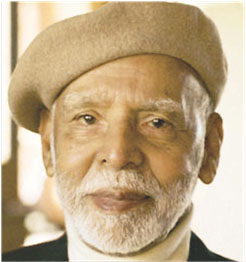
Indeed the saying that love makes the world go round, is probably very true because love causes us to care and care compels us to act. Every invention, every reform, every social act that has benefitted mankind has had as its basis, the emotions of love and care.
Wherever you look
But we don’t need to look at history or the daily news- papers for proof of love. Love’s imprint can be found in the smallest of incidents, transfiguring ordinary moments into sunlit cameos. My own list of favourite moments includes the sight of two little urchins travel- ling aboard my local suburban train. One was about four and the other seven. The seven year-old fished out an apple, and grandly offered it to the smaller boy. “Kha ja,” he said with an air of supreme opulence. The little boy took a bite of the apple with gusto and handed it back to his patron, who took a bite too before returning it to the small boy. From bite to bite the apple exchanged hands until it was demolished, and I don’t believe the look of ineffable satisfaction on the faces of the two friends came only from the nourishment of the fruit.
A few days back, I went to buy a tender coconut from a tiny hole in the wall shop that also stored coconuts in its front. The shop was run by a woman of about 30 with her two children, a girl of about eight and a boy of about three. Just then a man appeared from behind me. The faces of the children lit up. “Daddy,” they squealed. The look on the father’s face told me everything I need- ed to know. I was witnessing a happy family.
It is said that when Shiva discovered Brahma’s design of human life with its many sorrows and troubles inter- spersed with brief moments of joy, he was so distraught that he immersed himself in meditation and emerged with yoga – as the way out of the cycle of birth and death.
But perhaps what leavens this perilous human enter- prise and gives us the strength and will to continue is the presence of this thing called love. It is love that kiss- es our wounds and makes them all right. It is love that pours balm over our sorrow and enables us to get up next morning and feed the children. It is love that gives us the heroism, sacrifice, strength and dynamism we need to triumph over life and in doing so, it richly embellishes our life with meaning. Most of us live through the trials and tribulations of our lives because of the love of someone or the love for someone. But the power of love is even more lofty. For it is love that unravels the whole human adventure and leads us safe- ly back to God.
Love is all there. It is not just the grace that cocoons us through hard times or the prize that presses us to give of our best. It is our very nature. Love is who we are. And love is what the universe is. The whole of cre- ation vibrates with love. There is nowhere love is not. For God is love.
In the introduction to his book, A More Ardent Fire,
Eknath Easwaran quotes the Christian mystic, Mechthild of Magdeburg who said, “The soul is made of love and must ever strive to return to love. Therefore it can never find rest nor happiness in other things. It must lose itself in love.”
Easwaran comments thus on the quote: “Once we grasp the sense of these quiet statements, they can change our lives forever. They mean that being able to love fully, unconditionally, is our native state. We can- not lose this native capacity, cannot get rid of it even if we try. The most we can manage to do is cut ourselves off from it, burying our capacity for love under layer after layer of the self-centred conditioning that accu- mulates so easily in the modern world. But that condi- tioning can be removed, and when it is removed what remains is our original goodness, a capacity for love that is, in principle, without limit.”
What a promise! What a possibility! No matter how distant we may be from realising this glorious vision, how comforting to know that it is always there as our very own nature, waiting patiently for us to return to it.
The journey begins
So how do we begin this journey towards the centre of ourselves? Like all spiritual journeys, it begins with knowing ourselves. Discovering where we are in the love game. In all likelihood, we may find ourselves dauntingly far from our goal, especially if we are spurred by heady concepts such as uncondi- tional love and absolute love.
As we study ourselves, we discover our own selfishness, and how hard it seems to prioritise the needs of the other. At lunch- time, we automatically reach for the last cut- let on the plate even though it is clear that our younger sibling has the same idea. On the road, we refuse to give side to the driver horning from behind us, out of sheer cussed- ness. At work we scheme and strategise to get ahead of our colleagues.
Our own needs and preferences prevent us from being available even to those we profess to love. Your daughter may shake your knee for attention but you are too busy watching cricket on TV to notice her. Your wife adores karela but you can’t stand it so you never buy the vegetable. And blocks come in the way of restoring or renewing ties that have frayed with time. You know you need to develop your relationship with your sibling but find you have nothing to say to her. You would love to have a closer bond with your parents but the past comes in the way. You love your girl friend but that does not stop you from telling her which job to take or which colour outfit to wear. From the closest ties to the most distant, our capacity to relate to the other is muffled and distorted by our insis- tent wants, needs, dependencies and prefer- ences
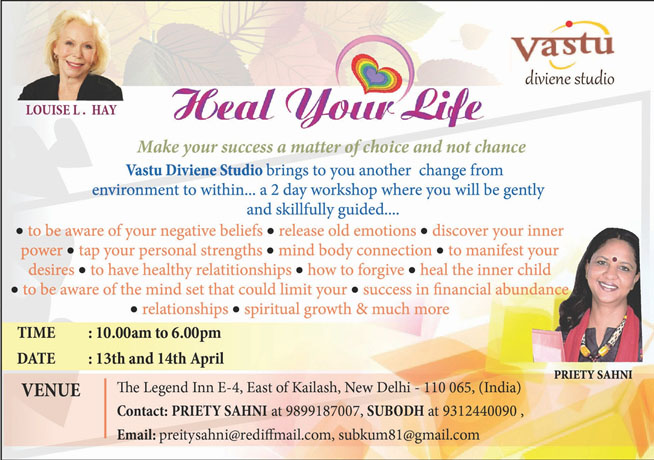
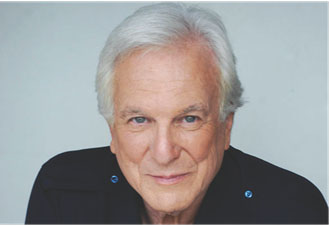
We cannot reach out to the other because we are too caught up in ourselves. Says Osho, the late maverick founder of the Pune-based Osho Meditation Centre, “At the lowest, love is a kind of politics, power poli- tics. Wherever love is contaminated by the idea of domination, it is politics. Whether you call it politics or not is not the question, it is political. And millions of people never know anything about love except this politics – the politics that exists between husbands and wives, boyfriends and girlfriends.” There is no relationship we can succeed at if we do not go beyond our ego, because the ego will inevitably foment conflict. Eckhart Tolle, one of the best known spiri- tual teachers of our times and the author of The Power of Now and A New Earth, writes on his website, “The ego singles someone out and makes them special. It uses that person to cover up the constant underlying feeling of discontent, of “not enough,” of anger and hate, which are closely related.” It is clear then that in order for there to be room for the other, ‘we’ must vacate the con- sciousness. In other words we need to free ourselves of our constant pre-occupation with our feelings, our past, our pain and our needs. We need in short to work on releasing the ego, more clearly called Ahamkara or the I-maker in Sanskrit. How do we do this?
Love yourself
The first step to eliminating the ego, which most spiritual teachers omit to explain, is to cultivate its health. There is no way we can eliminate our ego if we are caught in the clutches of poor self-esteem or self-hatred. The more insecure and unsure we are of our-selves,
But slowly, we will find that there is more space in our heads for our thoughts, feelings and actions. We no longer censor or suppress what we feel or think. We are no longer so quick to flay ourselves for making mistakes. Indeed, we permit ourselves to make mistakes, to be vulnerable, faulty and human. We learn to be there for ourselves and to become our own comforter and guide. I have been going through a rough eight months because of a bad case of Irritable Bowel Syndrome. No matter what treatment or medicine I tried, it would lose its efficacy within a few days. My digestion steadily decreased until even rice and dal became a challenge. Recently, after yet another treatment failed, I gave in to despair and spent a couple of hours in deep agony. It was my own love for myself that pulled me out of the state by whispering comfort and permitting me to feel the depth of my anguish. For the first time, I could palpably recognise that what the outside world could not give me, I could give to myself and that I could count on myself to be there through the direst of situations. This capacity to love and trust ourselves, to have space for our mental, emotional and physical condi- tions, and to support us gives us a strength that nothing else can. For the first time, we experience that elusive thing called freedom because it appears that our inner self can support and nourish us through any adversity. This means, in effect, that we no longer need to fear life or other people, for we have the inbuilt capacity to rise above any situation.
the more tightly we clutch our ego for it is all we have as self-protection. What is more, the less we love ourselves, the more dependent we are on the love, approval, appreciation and support of the world. Is it any wonder then that we are unable to love the other? We cannot give what we do not have and our own needs are too urgent for us to be able to spare time and energy for the needs of others. It is imperative therefore that we build up a healthy self-love and self-appreciation; we need to have confidence in our capacity to lead our lives and to have regard and respect for ourselves. Says the venerable Dalai Lama, “If you don’t love yourself, you cannot love others. You will not be able to love others. If you have no compassion for yourself then you are not capable of developing compassion for others.” In his book, The Six Pillars of Self-esteem, Nathaniel Branden, one of the foremost experts on self-esteem, says: “Self-esteem is the disposition of experiencing oneself as competent in coping with the basic challeng- es of life and as being worthy of happiness.” Louise L. Hay, one of the leading holistic health experts in the world, has always placed a huge premi- um on the importance of loving ourselves not just as the basis of fulfilling relationships but also as the foun- dation of our health and wholeness. Her recipe for making a habit of loving yourself includes: no self-crit- icism or self-terrorism (no frightening yourself with imagined scenarios of what might go wrong), being gentle, kind and patient with yourself, praising yourself, taking care of your body, and looking into the mirror to affirm your love for yourself. Healing your inner child is also an important aspect of learning to love yourself. NLP can also help you reframe many of your most neg- ative experiences and therefore help shift your image of yourself. Above all, remember who you are – you are the embodiment of love itself. The very Creator resides within. Therefore you are eminently worthy of self-love and self-worth. Says Louise Hay, “No matter how much chaos may be going on around us, no matter how many things may be going wrong or not the way we want them to, no matter what our bodies may be doing at the moment— we can love and accept ourselves. …. As we love and accept ourselves exactly as we are, it makes it easier to go through the so-called difficult times. We’re no lon- ger fighting ourselves. We’re accepting. We’re becom- ing tender. We’re cherishing ourselves. We’re comfort- ing ourselves and making it easier for ourselves.” Cultivating self-love takes time and effort because lack of self-love is endemic in our competitive and crit- ical culture; moreover, many of us have been damaged by having been brought up by parents who did not know how to safeguard our self-esteem.
As this becomes more and more a part of our reality, we begin to breathe and expand. We permit ourselves to feel, think and act as we in fact do, and our long repressed real self begins to shine out. The next step Eventually it enables us to move into the next step, which is to find a spiritual practice that will help us penetrate our mental and emo- tional storehouse and have the stability to accept all that awareness brings. It is this capacity for awareness and acceptance that will help us cut through conditioning and return to our true nature. Perhaps through meditation, yoga, chanting or other spiritual practices we continue to go deep into our- selves and we find we have what it takes to bear it. Very gradually, the mist that envelopes us and prevents us from seeing the other, dis- solves, and for the first time we become aware of the other, without the interfering image of the self. It is then that anything close to love flowers out – a love that is pure, with- out the corruption of the self.
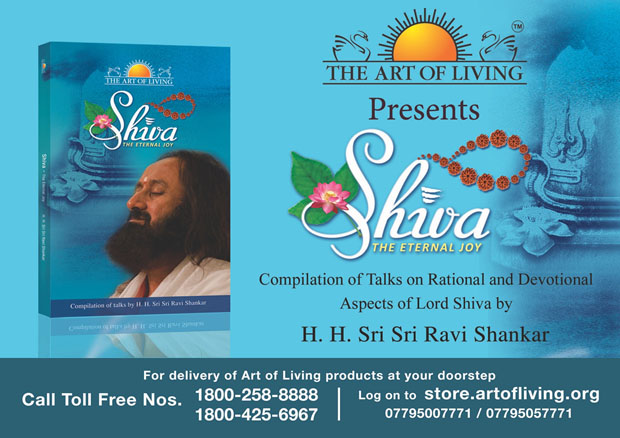
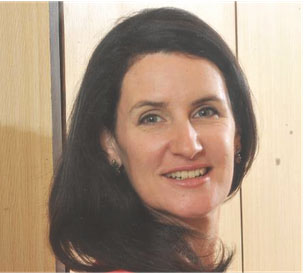
“Just before my father died, there was no persona, no ego, just the reality of who he really was: love.
-Irma Battig
So what is this love? Most of us have a glimpse of this state at some or other time of our life. Says Mumbai-based facilitator and healer, Irma Battig, “Different instances come to my mind when I think of pure, unadulter- ated love. One is when I was around 13. My youngest sister was two. She was a pretty amazing kid, huge blue eyes and a heart of gold. And even at that age, she gave the best hugs. Love just poured out of her, and from me to her, as she squeezed me tight. There were no fears, barriers, misunderstandings or anything else that could get in the way.
“The last day with my dad was another experience of pure love. I spent the day and a night at the hospital with him. We both knew he didn’t have much more time, we just didn’t know how much. But it was clear I would not see him alive again (I was leaving for India the next day). His heart was just so wide open, there was no persona, no ego, just the reality of who he really was: love. It was a shattering experience, because it contained the imminent component of loss. Grief and love were intertwined in my experience, the realisation of how much he meant to me, how much I adored him and how dearly I would miss him. And the pain and despair of not having been able to save him from his fatal ill- ness. But coming from him, I only felt com- plete love and acceptance. The memory of it still cracks me wide open. And I am immensely grateful to my father for having revealed himself and his huge heart so openly and lovingly.”
Learning To Love
As we grow in self-love and spiritual maturity, this capacity becomes a learned skill. Jacqueline Maria Longstaff, founder of Ashram of the Singing Heart in Arunachala, Thirvanamalai, says, “It is possible to be angry, upset, disappointed with someone and still love them, wish them well and not project these feelings onto them. I began to experience this state in the late ‘70s when I spent some time at an ashram in India. I was in a very difficult relation- ship with a man. One evening we were standing outside of the meditation hall where an evening of music, singing and dance had just begun. He hurt me deeply and in that moment I felt I had a choice. I could either close down and try to hurt him back, or I could take the music into my heart and go into the hall. I chose the latter. I entered the hall not trying to pretend I was happy and joy- ful. I was just deeply accepting of what was hap- pening and allowed the music in and let it begin to move my body – dancing happened. At the end of the evening I really understood what alchemy was. I could see that anything we can hold in the acceptance of the heart can be transformed. I understood that evening that I could trust my heart and that the love in the heart never goes away, but some- times we run from the heart because of the pain. I knew that evening that I could face anything in life and not turn away from the heart. This man and I are still good friends and we usually meet once a year to share a dinner and an inspiring talk.” She adds, “A fine way to develop unconditional love is to try to stay connected with the heart no matter what is happening. Often the big challenge is trying to stay in the heart when one judges oneself !”
Love in the air
It is through this capacity of staying in the heart and seeing through the heart that we become aware of the omnipresence of love. We see it reflected in the orderly movement of the planets and the faithfulness with which day turns to night and season follows season. We see it in the fruit-bearing tree, striving every moment to fill its branches with delicious fruits not for itself but for the other. We see it in the way water vapour escapes up, forms into clouds and descends again as life-giving water. We see it in the way the fecund earth covers itself with all manner of plant and animals to form food for its creatures. The whole of creation appears to resonate with love where each seems to live for the other. Says the French mystic-scientist, Teilhard de Chardin..“Someday, after mastering the winds, the waves, the tides and gravity, we shall harness for God the energies of love, and then, for a second time in the history of the world, man will have discovered fire.”
Thus we recognise that God is indeed love and that creation itself is a profound act of love. And that the great teaching that Creation is coaxing us to learn is simply this: to become love, and to live not for our- selves but for the other.
In A More Ardent Fire Eknath Easwaran says, “We can never be satisfied by loving just one person here and another there. Our need is to love completely, uni- versally, without any reservation – in other words to become love itself. It can take our breaths away to glimpse the vastness of such love.”
In his book, The Brothers Karamazov, the great Russian writer, Fydor Doestoesky describes that sort of love graphically, “Love all that has been created by God, both the whole and every grain of sand. Love every leaf and every ray of light. Love the beasts and the birds, love the plants, love every separate fragment. If you love each fragment, you will understand the mystery of the whole resting in God.”
Adds Osho, “At its highest, love is a religious state of consciousness. I love you too, Buddha loves, Jesus loves, but their love demands nothing in return.
“Their love is given for the sheer joy of giving it; it is not a bargain. Hence the radiant beauty of it, hence the transcendental beauty of it. It surpasses all the joys that you have known… you don’t love this person or that person, you simply love. You are love.”
Love such as this takes no thought for itself
– its focus is fully on the other. Wrung dry of the self, all its waking hours are bent only on benefiting the other. All the great saints and prophets have wrought their transformative effects on mankind simply because of the great love they bore them. Think of the Buddha and Angulimala or Jesus Christ and the prostitute. Coming down to more recent times, recall Mother Teresa’s surpassing min- istry or Mahatma Gandhi’s lofty struggle for Independence not through violence but through soul force – the capacity to bear the ills foisted upon us without retaliation, but on the contrary with good will and love. When such a love fills our body and soul, we become a fit instrument for God’s work in the world. We become a blessing to all we encounter and in turn we reap the blessings of all. Through love we crest the most sub- lime peak of human possibility. What else could we possible aspire for?
To read these articles online and post your com- ments, go to http://www.lifepositive.com/Magazine/ Apr2013. We welcome your comments and sugges- tions on this article. Mail us at editor@lifepositive.net
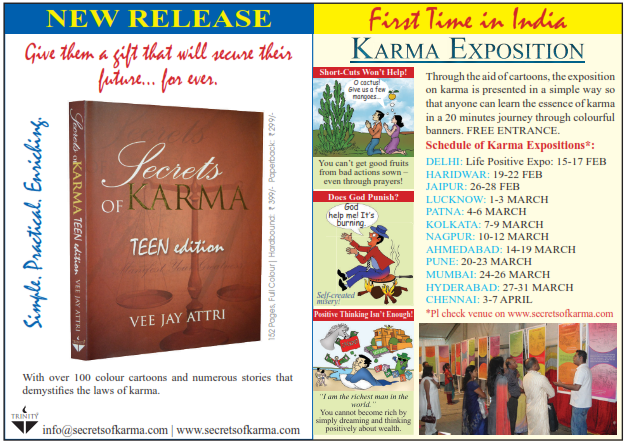
Secrets of Karma
